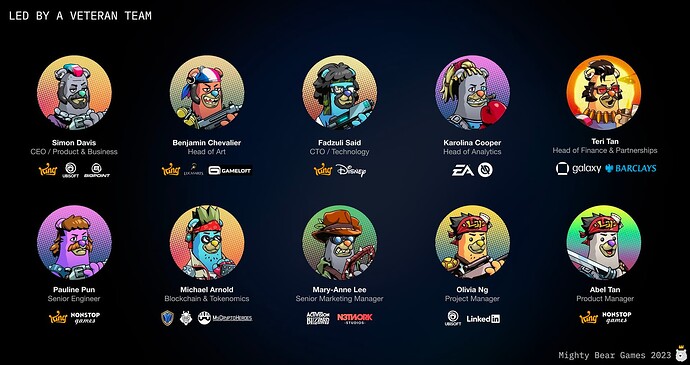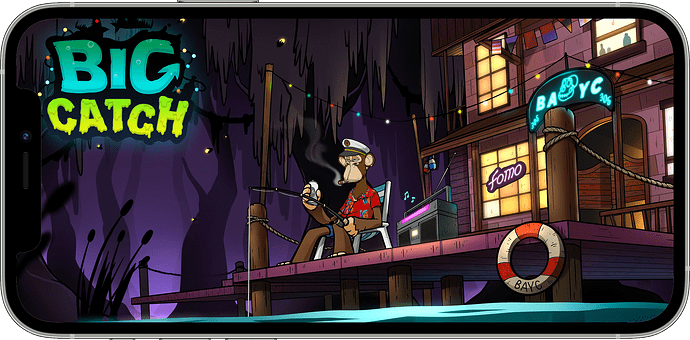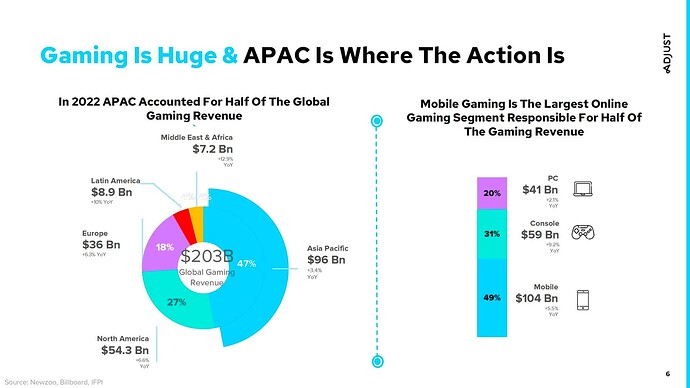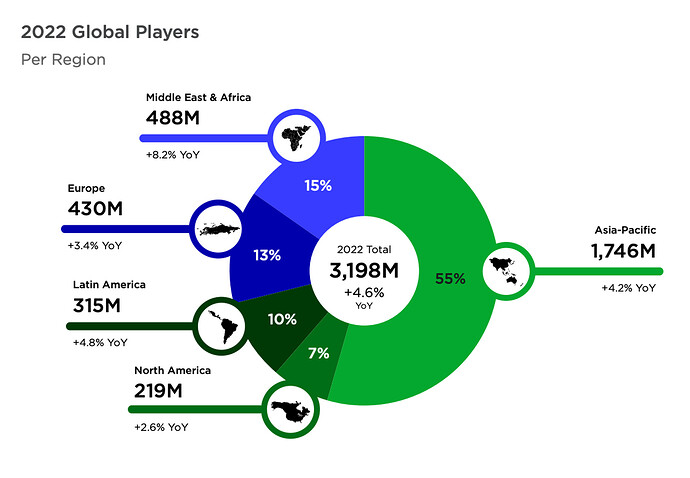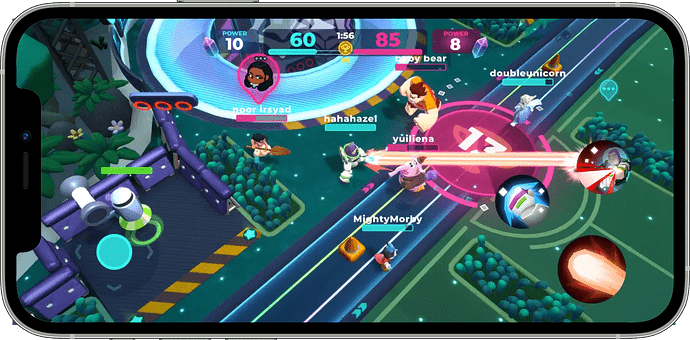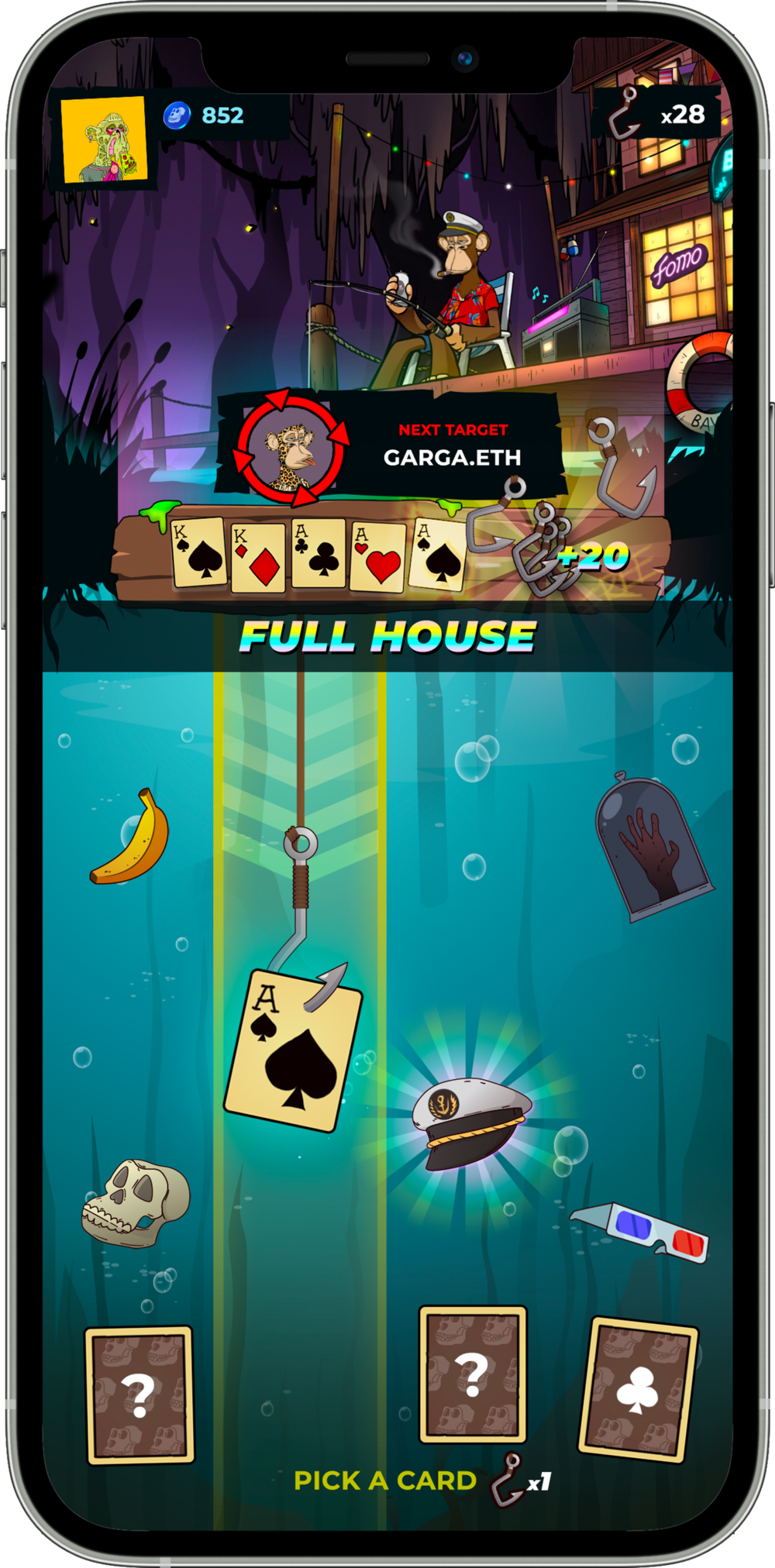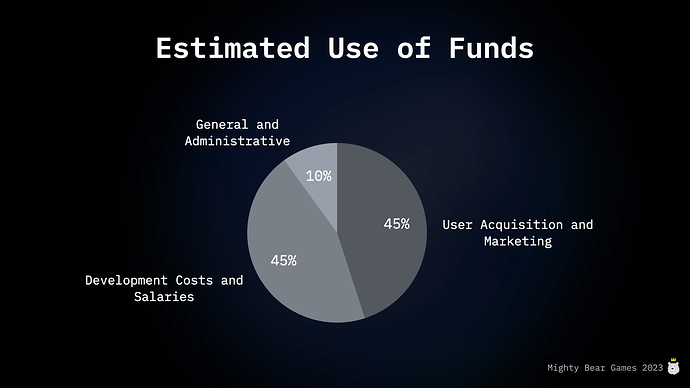If you would like to explore the idea more please click “vote yes” and give it a heart. Comments and questions always welcome.
Mighty Bear Games (MBG) know what it takes to ship and distribute hit games, as well as the level of intellectual rigor required for a project of this scale. We appreciate that there’s a lot of detail here, but asking grants isn’t monkey business.
In the realm of possibilities, lies a proposal teeming with tremendous upside for the DAO. Yet, let us not shy away from the truth—it demands nothing short of the DAO’s unwavering commitment to witness triumphant success. For, my friends, a venture of such significance merits the weight of profound contemplation. With utmost sincerity, we present this initial proposal as a testament to our resolute dedication to this noble cause. May it serve as a beacon, illuminating the path towards the realization of our shared aspirations. LFG.
TL;DR
- $20M grant for the first fully-integrated Web 3video game publisher. Initial $10M to get three to four titles to market. The remaining $10M to scale titles with a path to profitability. This grant would enable multiple fast to market, high upside shots on goal.
- Most teams fail at shipping games, this is especially true in Web3. The Boring Artists Agency (TBAA) is made up of industry veterans who have collectively shipped 100s of titles and generated $100Ms in revenues. TBAA will coach partner teams through shipping and get them the help they need.
- TBAA has deep expertise in Web2 (mobile, PC, and console) and deep Web3 sector knowledge. A multi-disciplinary approach is needed to make games that can cross over to the “crypto-curious” and run for years, not months.
- Publishing requires tech solutions. TBAA will offer its proprietary tech (built and battle-tested over 7 years) to partners. This provides partners with pre-built solutions for running a Web3 game at scale, significantly cutting down on risks and time to market.
- The leadership at TBAA has extensive experience negotiating with partners and working with AAA IPs. TBAA will ensure that partners always get a fair deal and access to the best opportunities.
- The goal of the DAO is to proliferate and propagate the use of ApeCoin. Our games will bring millions of new users to ApeCoin, and push the DAO’s vision forward.
- One-quarter of net revenues will go back to the ApeCoin DAO. It only takes for one title to be profitable for this to deliver huge returns to ApeCoin DAO.
- The best growth opportunities in Web3 are in Southeast Asia, APAC, and India. TBAA is based in Singapore, has an intimate understanding of the Asian market, and has the developer and partner networks required to succeed across the region.
- TBAA will only publish titles pushing the frontiers of Web3 forward.
Abstract
Since the dawn of time the wise men of Web3 prophesied “The Great Onboarding”.
“The Great Onboarding” was to be heralded by the arrival of the “Champions of Gaming”. Yet time and time again, the aspirants to the title were defeated by what became known as the three challenges:
- Shipping games is really, really hard. Many teams raise huge sums then fail to ship.
- “Ops is tuff.
 ” Only 30% of a game’s success is down to product, the other 70% is distribution and operations. Unfortunately, most game teams suck at these because they focus all their energy on making a fun game. The vast majority of great games die a lonely death every year.
” Only 30% of a game’s success is down to product, the other 70% is distribution and operations. Unfortunately, most game teams suck at these because they focus all their energy on making a fun game. The vast majority of great games die a lonely death every year. - Games were not fun. Game development is a craft. Working for other folks for decades allows you to learn from their mistakes, as well as developing an understanding of what goes into making a great game - the boring and unsexy parts of the job.
TBAA, led by industry veterans, is on a mission to support the most promising teams in Web3 and take their games to market. Once the games are ready, TBAA will provide infrastructure, a vast regional network, and operational expertise to scale to millions of users.
These titles will massively increase demand and usage of ApeCoin and the NFTs within the Yuga ecosystem.
ApeCoin DAO will help enable TBAA’s work by financing the development and publishing of three to four titles for a total of $20M. Only $10M will be deployed initially; the rest will be set aside to be deployed if a title has a clear path to scaling and profitability.
Funds will be distributed in stablecoins and $APE, aligning teams with the DAO as $APE holders and giving them a stake in the token’s long-term success.
TBAA will have regular syncs with the ApeCoin DAO’s leadership throughout to ensure the project remains aligned with the DAO’s vision and mission.
Top performing games make billions of dollars per year. If this project is successful, the DAO would benefit hugely and deliver value across the Yugaverse. As importantly, this initiative would deliver on the DAO’s mission to be the “protocol layer for community-initiatives that drive forward culture in the metaverse”.
This would be one of the most ambitious projects ever supported by a DAO and if successful, it’ll kickstart “The Great Onboarding”. Let’s make history.
Team Description
Team: Mighty Bear Games (MBG)
-
Established 2016. The first nine employees left King (makers of Candy Crush, over 3 billion installs and $2.8 billion in 2022) to found Mighty Bear. Today, we are 45 fully-doxxed game developers, dedicated to pushing the frontiers of Web3 gaming.
-
Team has multiple Yuga asset owners. Among the team are several MAYCs, BAKCs, one team member minted 10 Apes (though most sold sub 1ETH
 ), Otherside land, and lots of $APE. The team is full of degens who understand Web3 culture.
), Otherside land, and lots of $APE. The team is full of degens who understand Web3 culture. -
Dozens of AAA titles in their portfolio and decades of experience working on top-tier IPs including: Disney and Pixar, Star Wars, Harry Potter, Avatar, Rayman Raving Rabbids, Tom Clancy’s Ghost Recon, and Peter Jackson’s King Kong.
-
Diverse team distributed across 9 countries and dozens of languages spoken. Most of the team in Singapore (70%). EU office opening Q4 2023.
-
Prior to Web3, the team was responsible for generating $100Ms worth of revenue in Web2 gaming.
-
The founders (Simon Davis, Benjamin Chevalier, and Fadzuli Said) have all been professional game developers since the 2000s: first in console and AAA, then mobile, and now in Web3.
Overview of the MBG leadership team
- Mighty Bear successfully shipped complex collaborations with partners such as Apple (Butter Royale) and Disney (Disney Melee Mania) on-time and on-budget.
- MBG accomplished collaborations that typically require hundreds of staff over three to five years, but pulled them of with fewer than 40 staff. One project shipped in six months, and the other in 11 months.
- Currently building Mighty Action Heroes, the most exciting and ground-breaking battle royale built for the blockchain. Start rampaging here!
- Team built Black Bear atop seven years’ worth of proprietary tech. Black Bear is a backend for Web3 games (a layer online games can operate on, details in the graphic below) which we will share with partners to reduce risk and help get their games to market faster using proven tech. It’s already live in Mighty Action Heroes.
The Mission
We believe in ApeCoin DAO’s founding vision that “Culture has found new expression in Web3 through art, gaming, entertainment, and events. The possibilities for blockchain’s impact on culture are so endless that they can’t possibly all be predicted yet.”
This grant will be used to identify the most promising teams in the space, support them through the development process, and then distribute novel game experiences at the bleeding edge of what is currently possible in Web3.
To onboard the next billion users, we need to offer experiences that showcases the magic of Web3, moving beyond mere replicas of existing Web2 titles.
Many Shots on Goal, Maximum Chance of Success
Inspired by Lockheed’s Martin’s “Skunk Works” achievements via the pursuit of projects at the frontiers of the possible, TBAA will initially back three to four highly capable teams combining traditional game dev expertise with innovations at the cutting-edge of Web3 (such as the ERC-6551 standard) to give birth to new gameplay archetypes.
“Skunk Works” developed the first modern spy plane (the U-2) in 1955.
Leading mobile gaming companies, like Supercell (known for Clash of Clans, Clash Royale, and Brawl Stars, generated $1.9 billion in 2022), have adopted this strategy for years. They excel by employing small teams with minimal bureaucracy, granting them freedom to iterate rapidly and discover winning formulas. This approach has enabled them to generate several billion in revenue annually over the last decade with just a few hundred staff.
TBAA will prioritize deploying numerous potential winners rather than investing heavily in one or two costly projects. This approach fosters innovation and generates more opportunities for success. By nurturing a diverse ecosystem of small teams in friendly competition, collaborating, and sharing knowledge, we will outperform larger, slower organizations with greater resources.
Backed by Experience
Anecdotally, over 80% of games fail to ship on-time and exceed their budgets. This is especially true in Web3 and of teams that don’t have experience running a studio.
TBAA will assist external teams with regular milestone check-ins and offering expert support in game design, tokenomics, engineering, and art. Between us we’ve shipped hundreds of games, and there are few challenges we’ve not encountered before. Additionally, our team can provide coaching and connections to inspiring industry advisors. We understand that the founder journey may not always go as planned.
Avoiding mistakes others have made before and prioritizing the right elements are half the battle won. We will ensure teams have the right focus and decades of experience at their disposal.
An example of a challenging project shipped by Mighty Bear Games.
Fully-Integrated Publishing FTW
Web3 has a number of external publishers (such as TreasureDAO and HyperPlay) that provide distribution via their network. Our approach is different yet complementary: we’re bringing fully-integrated publishing from Web2 to Web3 gaming.
TBAA will focus on:
- Identifying, funding, and mentoring the best and brightest in Web3.
- Providing essential tech and tooling.
- Mighty Bear has the necessary technology to ship and run online games. We will share this with teams who want to focus on shipping or advise teams wishing to build their own tech.
- Helping teams in getting concepts market-ready.
- Offering support from veteran leaders in engineering, smart contract development, game design, tokenomics, economics, and art.
- Conducting in-market tests to validate market potential before launch. Testing retention (how often people come back), engagement (how much they play), monetization (how much they spend), and user acquisition costs.
- Negotiating with chains, external publishers, platforms, and regional partners.
- Simon Davis (CEO) and Teri Tan (Head of Finance and Partnerships) both have extensive experience leading complex deals and will ensure partners get fair deals and avoid common pitfalls.
- Teri has worked on billion dollar M&A transactions, early investments in crypto unicorns, and notable Web3 deals, including the sale of Blockfolio and Improbable’s raise.
- Simon Davis (CEO) and Teri Tan (Head of Finance and Partnerships) both have extensive experience leading complex deals and will ensure partners get fair deals and avoid common pitfalls.
- Handling localization, QA, and culturalization.
- Providing go-to-market plans, marketing, and user acquisition for both Web2 and Web3.
- Offering publishing tooling, in-game analytics, user insights, and market intelligence for live games.
-
- Extending a game’s lifespan through Live Operations (LiveOps) support, which includes in-game events, updates, sales, and seasonal content.
- Mighty Bear team been involved in LiveOps for dozens of franchises including: Hearthstone, The Need for Speed, The Sims, and Tom Clancy’s: Ghost Recon, and Legendary: Heroes Unchained
- Extending a game’s lifespan through Live Operations (LiveOps) support, which includes in-game events, updates, sales, and seasonal content.
MBG is fully equipped to handle all of the above. TBAA will collaborate closely with partner teams from the outset to integrate Growth features into the development pipeline. This early consideration of Growth and Ops needs ensures real-time data feedback to the development team, fostering a virtuous cycle between publishing and development.
Our integrated approach enables rapid iteration and early validation of market potential in a cost-efficient manner. Only once product-market fit has been demonstrated through rigorous quantitative testing will user acquisition occur at scale. This ensures not a single dollar is wasted.
An ApeCoin Powered Ecosystem of Interoperable Experiences
Example of a Yugaverse game concept mock-up developed by Mighty Bear Games.
The future of Web3 will be made up of multiple interoperable experiences enjoyed by players using assets they’ve collected on their Web3 journey.
Combining this spirit of openness with the ApeCoin DAO’s founding vision, we believe that the DAO’s output should move the space forward, rather than try to provide yet another gaming ecosystem in Web3.
To avoid further fragmenting Web3, we aim to partner with an existing ecosystem, focusing on our strengths rather than competing in well-established areas. Mighty Bear has a strong relationship with TreasureDAO and all the other key players in the space. These titles will bring millions of users to Web3 and push the DAO’s vision of the metaverse forward
For these gamers their first point of contact with the metaverse will not be BTC or ETH, it will be ApeCoin.
The Best Publishers Also Develop Games and Leverage That Knowledge Across Projects
Mighty Bear Games is both a development studio and a publisher. We regularly ship games, collaborate with major partners, and use our tools in a live service environment. The top publishers (Epic, Blizzard, Valve, Nintendo, etc.) excel at working with external parties because they have in-house game development teams that inform and enhance their publishing approach. They have in-house customers to whom they are accountable, which sets them apart from other publishers who create tools without actually using them.
All of the studios within The Boring Artists Agency will benefit from the co-learning opportunities offered by sharing across multiple games. Each game’s successes (and failures) will inform the approach of the next game and vice-versa. This creates a virtuous cycle of collaboration and learning true to the spirit of Web3.
An example of a Yugaverse concept taking learnings from the Mighty Action Heroes Perks System to develop a progression system.
The Economic Opportunity
In 2022, the games industry was valued at $249.55bn. By 2030, it is expected to reach a staggering $665.8bn. The dominant platform by far is mobile representing 77.7% of digital gaming revenues (and over half of all games industry revenues). For context, Web3 gaming generated $3.4bn in 2023, though it is projected to reach $49bn by 2030.
The Geography of Gaming, Web3, and the Need for Local Knowledge
The last decade has seen the industry’s economic center of gravity shift away from Europe and North America toward China and the broader APAC region. The next decade, and Web3 specifically, will continue this trend of shifting away from the West, driven by consumers in the global south. (Additional sources: 1, 2, 3).
Source
To maximize their odds of success in Web3, publishers need to have a physical presence in Southeast Asia and networks in key territories such as Philippines, Indonesia, Vietnam, India, as well as Latin America (LATAM).
Though $20M may seem like a lot of money, it’s a very modest budget to publish multiple titles. Big-budget games often have marketing budgets in the $100Ms. The teams with a low enough burn to be able to build a solid proof of concept and run marketing tests for ~$3M, are most likely to be in APAC, Southeast Asia, India, and Europe, which is also where most of our players will be.
Mighty Bear is based in Singapore and has deep connections to the development ecosystems in Southeast Asia, India, APAC, Europe, and the US. Additionally we have contacts in MENA and LATAM we can leverage.
The Publishing Opportunity
Web2 mobile game distribution is fundamentally broken. In 2023, the cost of user acquisition increased to the point where scaling a game to profitability costs tens or even hundreds of millions of dollars. For most Web2 studios, the cost of acquiring users is greater than the amount of revenue a game could ever generate.
Web3 fixes this by enabling a direct-to-consumer relationship and cutting out the $40 billion a year that Meta, Google, and other ad networks extract from the gaming ecosystem. Instead, Web3 offers players a say in the ecosystem and a stake in the game’s future success.
Through this initiative, the ApeCoin DAO will be helping to re-write the rulebook for publishing. No-one has yet cracked Web3 game publishing. This is a multi-billion dollar opportunity and if successful, the ApeCoin DAO would be one the main beneficiaries.
“The Nintendo of Gen Z” is not going to be a mobile studio or a company putting discs in boxes. The next era-defining games will be built by companies that enable player-owned and operated ecosystems.
IP and Brand Partnerships to Accelerate Publishing
Partnering with IPs is a great way of reducing publishing risk and increasing a game’s chances of success. IPs offer immediate brand recognition and bring a ready-made fan base. Games that partner with big brands, either with a branded game (like Star Wars: Galaxy of Heroes) or special events (Dragon Ball in Fortnite), can have outsized results.
The Mighty Bear team has decades of experience working with the most challenging IP partners in the world.
Cracking the Code for Mainstream Gamers
Given the outsized impact of mobile and the dominance of Asia (a mobile-first region), the medium-term (five years) will require a hybrid approach: mobile experiences with a seamless onboarding for easy access, married with gameplay only made possible by Web3.
Winners will be the teams with a proven track record in mobile, who are deep into Web3, and understand its tech, ecosystem, and culture. These teams will be able to take complex experiences, and repackage them in ways which are approachable and fun. Mighty Bear has strong multi-platform experience and the proprietary tech to bring Web3 experiences to mobile, PC, and consoles. Whether you’re on the go or at home, The Boring Artists Agency will always be at your fingertips.
Roles and Responsibilities
The image below shows the roles and responsibilities as well as the flow of funds through the ecosystem:
- The Development Studios are responsible for creating gameplay concepts (Games A, B, and C in the diagram above). By taking a “strike team” approach spread across multiple titles, the DAO will have a much greater chance of success than by focusing on one or two big titles.
- Publishing is responsible for Operations (though in practice parts of this are shared with the Development teams), User Acquisition, and Revenue generation. They are also focused on community engagement, Web2 and Web3 distribution, relationships with marketplaces and app stores, negotiating partnerships, and bringing in IP opportunities.
Flow of Funds
- Initial grant ($10M) from ApeCoin DAO would be split between stablecoins and $APE
- Publishing team identifies promising projects, signs them, and pays when specific milestones are met. Once a concept is sufficiently developed, TBAA will run marketing tests. If a title demonstrates traction the publishing team invests in scaling the game.
- If a title has a clear path to profitability, TBAA draw down the remainder of the grant ($10M).
- Publishing team takes net revenues (minus platform and ad network fees) and sends one-quarter back to the ApeCoin DAO, splitting the remainder between Publishing and Development to enable reinvestment.
Long-term incentive alignment (royalty split) is key to the success of any publishing initiative. If the publisher and developer are only incentivized to deliver games but don’t have any upside in their long-term success, the outcome will be that the grants only attract lower quality “work-for-hire” teams with no incentive to make the game a success. The money will be wasted.
The first breakthrough Web3 title will enable capturing all of the value of the best Web2 experiences plus the uncapped upside of Web3.
Top-performing live service games (Candy Crush, Clash of Clans, World of Warcraft etc.) generate huge revenues for decades not just one or two years.
Example of what adding value to NFT holders could look like: in this concept event a player is able to fish up special event bonuses (such as the Captain’s Hat or 3D glasses) exclusive to the Yugaverse NFTs they own. The player could then choose whether to keep or sell these.
How Does This Benefit the DAO?
The DAO will benefit in four ways:
- ApeCoin usage: ApeCoin will be the primary means of exchange for all titles developed by The Boring Artists Agency. Millions of new users will be onboarded to Web3 via $APE and the Yugaverse, which in turn will drive demand and usage for $APE. This is consistent with the DAO’s objective for APE to serve as a “decentralized protocol layer for community-led initiatives that drive culture forward into the metaverse”, as well as increasing demand and utility for the token.
- Bringing revenue back to the DAO: Net proceeds from any games published by TBAA will be split between the Apecoin DAO and TBAA. This is a proposal that could generate profits far in excess of the original investment for the DAO.
- Increased value and utility for Yugaverse assets: Game economies developed under this proposal will seek to find ways to support existing Yugaverse assets and reward holders.
- Brand Partnerships for the $APE ecosystem: Mighty Bear has proven experience working with AAA IP owners and will leverage these relationships to onboard large IPs into TBAA titles and the $APE ecosystem once product-market fit has been demonstrated.
Use of Funds and Schedule
We are requesting $20 million in funding from the ApeCoin DAO to cover the development and publishing of multiple titles. This is to be paid in two tranches of $10M. The first tranche will be issued on approval of the proposal and the second tranche will only be drawn down once a game has proven product-market fit and a clear path to profitability.
Based on previous titles, a rough breakdown of costs is follows: 45% on user acquisition and marketing, 45% on salaries, and the remaining 10% on equipment, software, outsourcing, licenses, and general and administrative items.
The budget will be split between development and publishing teams across the duration of the program. Though publishing is more expensive, not all titles will make it to market, which is why costs will even out. The publishing team will only invest in scaling titles with proven product-market fit, whereas the development will working on all games (including the ones that don’t make it), from concept through to launch.
TBAA will deploy publishing support teams throughout the duration of the program. The total number of teams will be determined by the scope of the games signed under the program.
Once a suitable gameplay prototype has been identified, TBAA will run marketing tests to validate interest from demographics in key geographical territories. Once product-market fit has been demonstrated, the team will rapidly scale the game in question. The DAO will then start to see revenues flowing back to the treasury.
The project will take place over an initial 24-36 month period. The first six months will be spent on sourcing, pre-production, conception, and getting regular input from the DAO’s leadership. The project leadership will then make themselves available for monthly check-ins with the DAO’s leadership to provide updates and ensure alignment throughout the duration of the program.
Sequence of Events
- DAO approval, sourcing and team ramp-up begins. Team available for syncs with the DAO leadership every two weeks for first four months. Team would share progress on concepts with the DAO’s leadership and provide regular updates.
- First concepts confirmed.
- Development roadmap locked for first concepts.
- First game Alpha versions made available for holders to test and provide feedback.
- Throughout its history, Mighty Bear Games has consistently shipped titles in under a year. This is almost unheard of in the games industry. We will work to bring this expertise and discipline to partner teams.
- Games start to go into Open Beta.
- User acquisition proven to be profitable at scale.
- Global launch of successful Beta titles.
Expected Outcomes and Impact
Gaming is at the forefront of popular culture. From 12M people joining a concert in the metaverse to owning Hollywood, gaming dominates the popular consciousness across ages and geographies. Being at the forefront of a new cultural revolution will uniquely position the DAO to benefit in from the uptake of ApeCoin as the protocol layer for this shift. This could provide the momentum for the ApeCoin DAO to expand to all other cultural touchstones such as film, TV, lifestyle brands, and even music.
Potential Challenges and Mitigation
The video game industry is competitive, expensive, and risky
Mighty Bear Games has multiple successful titles under its belt and has developed proprietary tech to help ship games which mitigates some of these challenges. We believe that partnering with established ecosystems and leveraging our extensive network to explore different strategic Web2 publishing partnerships (such as: VNG in Vietnam, Globe in Philippines, AKG in Indonesia, Babil in MENA, MPL in India, Miniclip for mass market Web2 scale, etc.), de-risks this even further.
Web3 games haven’t crossed over to mainstream players and there is fierce resistance to the tech in the broader gaming community
Traditional gamers have been put off for a number of reasons: misinformation, the industry’s at-times exploitative approach to monetization, and the dearth of quality Web3 titles to-date. We believe that players gravitate to groundbreaking games and experiences regardless of the platform or business model. Clash of Clans onboarded hundreds of millions of hostile gamers to mobile F2P almost overnight.
Web3 needs killer apps, and ApeCoin DAO is positioned to be both the enabler and the beneficiary of them.
Many of the best game devs are still resistant to working in Web3
Success begets success. The early days of mobile gaming saw dismissive attitudes from developers. Today it attracts the best and brightest, keen to create games that reach the largest audiences. As the industry shifts and the space matures, more will follow.
Mighty Bear Games has a track record of successfully onboarding veteran Web2 devs to Web3. We expect this to continue by consistently shipping and proving the potential of Web3.
We believe that with ApeCoin DAO we will convert the unbelieving masses and drive Web3 culture forward together into the metaverse.
Next Steps
If our proposal is accepted, we will begin sourcing the first batch of concepts immediately, with a goal of locking down initial prototypes in four months, and having the first public playable builds within 12 months of development commencing.
Author: Simon Davis, CEO at Mighty Bear Games
Simon Davis is the co-founder and CEO of Mighty Bear Games, a leading mobile-first, multi-platform game developer in Southeast Asia – creating accessible, genre-defining, multiplayer experiences in Web3.
With nearly two decades of experience, Simon previously held management and product lead positions at the likes of King, Ubisoft, Bigpoint, AKQA, Empire Interactive, and Laughing Jackal.
In 2016, Simon joined forces with Fadzuli Said and Benjamin Chevalier, to launch Mighty Bear Games. From the outset, Mighty Bear Games was intentionally designed as a studio centered on positive values, showing that you can do the right thing by staff, players, and investors. Over the past six years, Simon has led Mighty Bear Games in launching titles including Butter Royale and Disney Melee Mania, while the studio’s first Web3 title, Mighty Action Heroes, went into Open Beta in July 2023.
For more information about this proposal, please contact apecoin@mightybeargames.com



